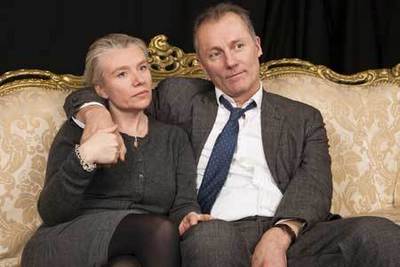Accolade, Finborough Theatre
reviewed for The Spectator, 16 February 2011

Saskia Wickham and Aidan Gillett
Scramble the last RAF jets, re-commission Concorde, or do whatever else it takes you to get down at supersonic speed to the box office of West London’s Finborough Theatre. Today, the tiny theatre announced that two more matinees have been added to the blink-and-you’ll-miss it run of Emlyn William’s forgotten 1950s gem, Accolade. The production started its run last week and is already almost booked out thanks to the presence in the cast of that recent victim of violent death, Graham Seed, better known as nice-but-dim Nigel Pargitter from The Archers.
But, with apologies to my fellow Archers fans, it’s taken something more than a genteel radio soap star to send ticket sales soaring into the stratosphere. The root cause of the production’s word-of-mouth success is the praise coming in for Blanche McIntyre’s fluid yet forensic direction, which gently exposes the devastating human and artistic vulnerabilities that lie beneath the sparkle of William’s witty dialogue.
Internationally celebrated, counter-cultural author Will Trenting (Aden Gillett) agonizes over whether to accept a knighthood, though it will thrill his posh wife (Saskia Wickham). At first, we think he’s just reluctant to accept absorption into the establishment, although he enjoys the other trappings of success: a grand house in central London, regular homages by the BBC, and the security of his son’s place at a leading public school. Yet it gradually emerges that Trenting’s reluctance to become a public figure has less to do with modesty than with his penchant for orgies in North London pubs – a penchant that is becoming harder and harder to keep secret.
McIntyre’s production captures with chilling accuracy the paranoiac relationship with the media endemic to public life: a photographer hanging around outside throws Trenting into a cold sweat, until we hear that the man’s chasing no scandal, but just wants a smiling snap of a newly minted knight. When the BBC telephones ominously, we can hardly bear to listen, tense on tenterhooks until it’s revealed they only wanted to finalise details for the great man’s latest appearance on an arts show. The audience’s collective shoulders sink into relaxation. So far, so very contemporary. Which is why we sometimes forget that the production is set in 1950, not in the current climate of EyeSpyMP. McIntyre’s brilliant achievement is to make Emlyn William’s censorship-era play seem effortlessly contemporary and frighteningly relevant.
There’s one more reason why William’s play transcends its period 60 when so many others fail. Accolade is heavily autobiographical and functions partially as cipher for William’s bisexual affairs, in an era when homosexuality was still too heavily censored to be portrayed sympathetically on stage. Yet, where he could have portrayed Trenting as a wholly justified free spirit (his wife, after all, knows and rather enjoys hearing about his adventures), Williams created a man whose adventures get so far out of control that even the most sexually liberated of 2011 audiences will still find themselves shocked and uncertain how to judge.
The only unsubtle element to William’s drama is the uncomfortably didactic insistence on the ‘authenticity’ of working class experience, a reductive claim reasserted repeatedly with all the self-righteousness of post-war iconoclasm. Trenting, you see, has to mix with Rotherhithe rough trade or else he’d never have anything to write about, for the middle and upper class literati live merely ‘life at second hand’. Tell that to Philip Sidney, Milton or TS Eliot.
Fortunately, McIntyre’s production avoids being bogged down by questionable aesthetic debate and focuses on the enthralling nexus of relationships and dilemmas at the heart of the play. Aden Gillett is superb as the ambiguous Trenting, but it’s Saskia Wickham who really takes the breath away. Her nuanced performance as Trenting’s resilient wife is an inspirational reminder, not only that Wickham is one of her generation’s most magnificent actresses, but also of the enduring power of love.
I can assure Archers fans that, judging by this performance, the best years of Graham Seed’s career may still be ahead of him, cruelly ditched as was after 30 years of service to Britain’s favourite radio drama. They’ll have to wait a bit before finally arrives on stage, but when he does, Nigel Pargitter is nowhere in sight. Instead, we see a compelling, convincing performance in Accolade’s most mysterious role: a shabby, sad little man who might be a blackmailer… but might be made of more noble stuff.
All the players deserve a wider audience than the Finborough can give them, but for now, beg borrow or steal to get a ticket.






